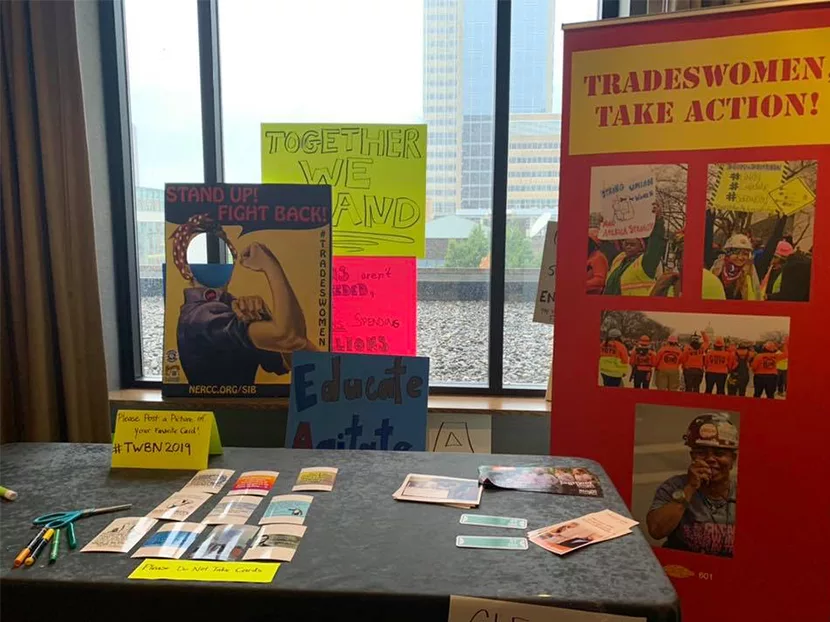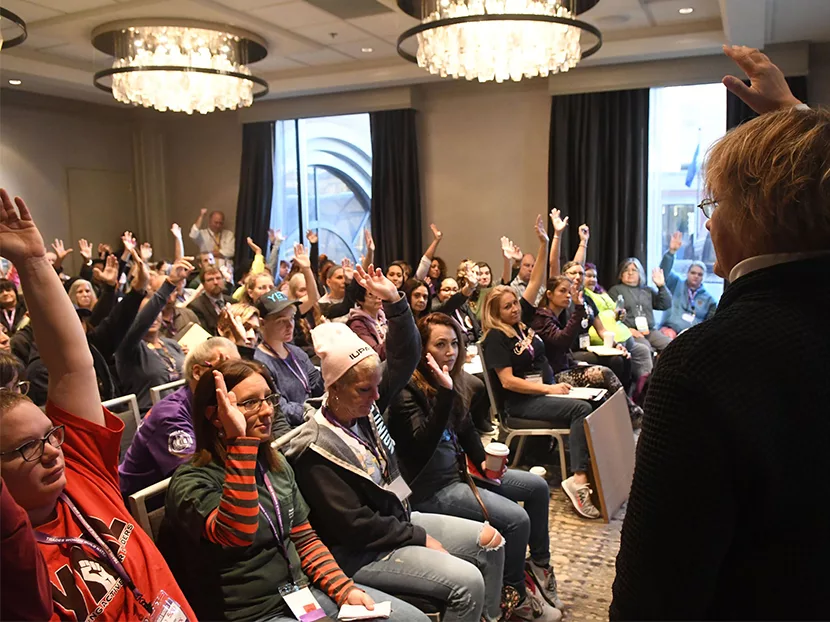The National Taskforce on Tradeswomen's Issues (TWTF) held its annual meeting at the tail end of the Tradeswomen Build Nations 2019 Conference (TWBN) in Minneapolis from Oct. 4-6. On Monday, Oct. 7, members of the Taskforce gathered at local union offices for the annual meeting. Attendance totaled 55 attendees from nine trades and 14 states. The group consisted of tradeswomen, union/apprenticeship staff members, researchers/academics, attorneys and other tradeswomen advocates. Comprised of four committees, policy, communications, action and research, the members met with their respective committees to review yearly accomplishments and set goals for 2020.
Action
In 2019, the Action Committee of the TWTF supported the North America's Building Trades Unions (NABTU) agenda by educating tradeswomen on multiple federal regulation proposals that would damage workplace protections for workers (such as the "IRAP proposal" that would allow corporations to set their own training standards without regard for apprentice and workplace safety), as well as recruited tradeswomen to make comments against proposed Title IX changes (harmful to women and girls) and identified tradeswomen to give testimony on the Department of Labor's Nursing in the Workplace forum. At the 2019 TWBN Conference, the Action Committee put on a workshop titled, "Tradeswomen Advocacy 101" for more than 100 participants and collaborated with Oregon Tradeswomen, Chicago Women in Trades, and IBEW Locals 110 and 292 to organize an ACTION STATION booth and Solidarity Poster-making mini-workshop, led by rank and file tradeswomen from the region. For 2020, the Taskforce set an ambitious agenda to keep up with critical issues facing tradeswomen today: provide education on maternity leave policies (by trade and state); recruit individual and organizational support and endorsements of the TWTF Policy Platform; engage with the Lean-In Women in Trades movement, and center trans and nonbinary tradesiblings' worker issues within the TWTF organization and beyond. In addition, with the presidential election a month after the 2020 TWBN Conference, happening in Washington, D.C., the Taskforce will ensure that tradeswomen's issues (and workers' issues at large) are addressed on Capitol Hill, by organizing workers to participate during the conference week in any opportunities in D.C. that might arise during that critical time in American politics.
Communications
Chaired by Danae Pouliot, as one of the newer committees, past accomplishments of the year include creating the committee, updates to the website and a document of resources for tradeswomen that was made available online. A co-chair, Allie Perez, was appointed at the annual meeting. Goals for 2020 include creating an approval process for communications, building brand awareness by providing regular posts and re-implementing Tradeswomen Tuesdays, a social media movement to draw attention to and humanize tradeswomen.
Research
The Research group within the TWTF organized approximately two years ago. This group brings together individuals engaged in research which is relevant to women in the building construction trades. Members work to build coalitions and encourage and promote research which supports tradeswomen’s quality of life. The current chairs of the group are Khadeeja Gibson (tradesperson representative) and Ariane Hegewisch (researcher, Institute for Women’s policy research). In 2019, for the second consecutive year at TWBN, members of the Research Group put together a panel of applied researchers to discuss their work as it relates to women in the building trades. Panel participants included Heidi Wagner, program coordinator in construction engineering and management, South Dakota School of Mines and Technology (moderator); Molly Martin, retiree, IBEW Local 6; Brigid O’Farrell, independent labor educator; Maura Kelly, assistant professor of sociology, Portland State University; Tiffany Thompson, construction career pathways program manager, Portland Metro; and Emily Seifert, researcher in wearable technology, University of Minnesota. Topics were diverse and included collecting tradeswomen’s oral histories; assessing a new mentoring program for Seattle tradeswomen; conducting and promoting the Regional Construction Workforce Market Study; and improving personal protective equipment (PPE) for tradeswomen. The Research group also participated in the caucus sessions at the conference with a researcher and advocate meet-up where discussion of current needs in tradeswomen research and opportunities for collaborations were highlighted.
Policy
In 2019, the TWTF Policy Committee advocated at all levels for public policy that benefits and supports women in apprenticeships and the trades. The Committee supported TWTF to finalize and promulgate the TWTF Policy Platform. TWTF members advanced multiple initiatives to promote tradeswomen and safe and harassment-free worksites at the local and state level including successes in California, Boston, and New York City. The Committee also supported union-led policies in gender-related issues such as family leave, anti-harassment and anti-bullying campaigns and supported the submission of comments on the proposed IRAP regulations and the proposed OFCCP religious priority change to Executive Order 11246. During the 2019 TWBN Conference, the Committee presented a policy advocacy workshop attended by more than 140 tradeswomen and the annual Policy Forum on Tradeswomen Health and Safety. In 2020, the Committee will provide the skills and tools to empower tradeswomen to engage within their union and advocate for policies at the state and national levels on issues such as child care access, paid leave and sexual harassment; promote tradeswomen in leadership and those aspiring to leadership; and expand its network of allies. Finally, the Committee will develop educational programs on issues relevant to tradeswomen, including the apprenticeship Equal Employment regulation 29 CFR 30, prevailing wage laws, project labor agreements, compliance strategies, and enforcement of existing non-discrimination and equal employment opportunity requirements.







